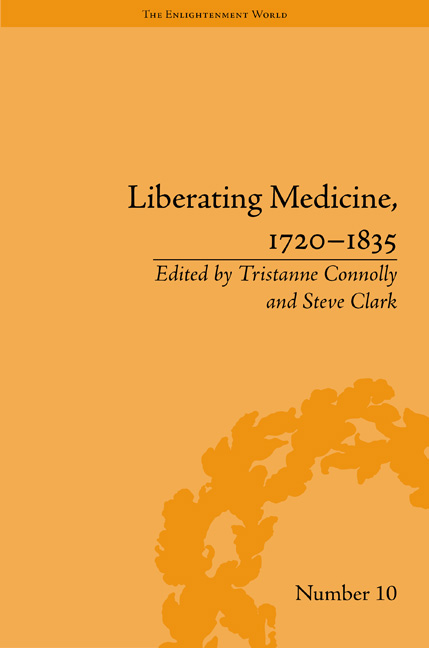Book contents
- Frontmatter
- CONTENTS
- Acknowledgements
- Contributors
- List of Figures
- Introduction
- I Spiritual Sickness and Hypochondria
- II Health and Emancipation
- 4 Due Preparations: Defoe, Dr. Mead, and the Threat of Plague
- 5 An Organic Body Politic: Wollstonecraft's Historical and Moral view of the Origin and Progress of the French Revolution and John Brown's Idea of Health
- 6 Blake, Liberation and Medicine
- 7 Untying the Web of Urizen: William Blake, Nervous Medicine, and the Culture of Feeling
- III Madness
- IV Anatomized and Aestheticized Bodies
- V Birth
- Notes
- Works Cited
- Index
6 - Blake, Liberation and Medicine
from II - Health and Emancipation
- Frontmatter
- CONTENTS
- Acknowledgements
- Contributors
- List of Figures
- Introduction
- I Spiritual Sickness and Hypochondria
- II Health and Emancipation
- 4 Due Preparations: Defoe, Dr. Mead, and the Threat of Plague
- 5 An Organic Body Politic: Wollstonecraft's Historical and Moral view of the Origin and Progress of the French Revolution and John Brown's Idea of Health
- 6 Blake, Liberation and Medicine
- 7 Untying the Web of Urizen: William Blake, Nervous Medicine, and the Culture of Feeling
- III Madness
- IV Anatomized and Aestheticized Bodies
- V Birth
- Notes
- Works Cited
- Index
Summary
Because literary critics tend to associate bodies with fixed materiality, the body seems intransigent to change. And insofar as medicine is associated with health and disease, it seems antithetical to liberation insofar as ‘health’ – often ambiguously defined – has often been invoked in the national interest, and pathology has been an especially effective engine of empire, sexism and classism. Foucault has been so persuasive that the life sciences are a form a bio-power that medicine is considered tantamount to the maintenance of norms and the development of proper bodies. Paul Youngquist, for instance, has argued that ‘the British Romantic period coincides with the cultural consolidation of a proper body’ and that the ‘proper body emerges as a means of regulating corporeal agencies in liberal society’. My own work suggests that the proper body was far more pluralistic and open to negotiation than Youngquist allows for. The disciplinary force of medicine was accentuated by industrial capitalism; having sufficient national manpower meant that diseases and birth had to be controlled, and that hospitals were reserved only for the ‘deserving poor’. Finally, medicine relies upon the science of anatomy, and both anatomy and sex have been repeatedly mistaken for destiny.
To the extent that the bodies of the poor in this period were fodder for medical experimentation and knowledge, with doctors going so far as to steal bodies to learn anatomy, medicine indeed has a pernicious legacy. Yet this view of medicine is far too one-sided: medicine played a crucial role in the revolutionary ferment of the age, and it could do so because of its complex and often sceptical attitudes towards the human body. For Foucault, bio-power ‘designates what brought life and its mechanisms into the realm of explicit calculations and made knowledge-power an agent of transformation of human life’. Insofar as his notion of bio-power hinges on ‘explicit calculations’ and ‘knowledge-power’, it underestimates the extent to which scientists and physicians were sceptical about the body as a form for hierarchy, and the degree to which physiologists were interested in competing forms of embodiment or metaphors of embodiment that questioned hierarchies written onto bodies.
- Type
- Chapter
- Information
- Liberating Medicine, 1720–1835 , pp. 83 - 96Publisher: Pickering & ChattoFirst published in: 2014

